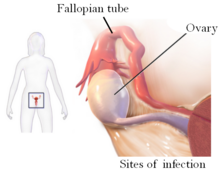| Tubo-ovarian abscess | |
|---|---|
 | |
| Drawing showing the sites of a tubo-ovarian abscess | |
| Specialty | Urology, gynaecology |
A tubo-ovarian abscess (TOA) is one of the late complications of pelvic inflammatory disease (PID) and can be life-threatening if the abscess ruptures and results in sepsis. It consists of an encapsulated or confined pocket of pus with defined boundaries that forms during an infection of a fallopian tube and ovary. These abscesses are found most commonly in reproductive age women and typically result from upper genital tract infection.[1][2] It is an inflammatory mass involving the fallopian tube, ovary and, occasionally, other adjacent pelvic organs. A TOA can also develop as a complication of a hysterectomy.[3]: 103
Symptoms typically include fever, an elevated white blood cell count, lower abdominal-pelvic pain, and/or vaginal discharge. Fever and leukocytosis may be absent. TOAs are often polymicrobial with a high percentage of anaerobic bacteria. The cost of treatment in the United States is approximately $2,000 per patient, which equals about $1.5 billion annually.[1] Though rare, TOA can occur without a preceding episode of PID or sexual activity.[4][5]
- ^ a b Pelvic inflammatory disease. American Family Physician, Vol. 85, No. 8. (15 April 2012), pp. 791-796 by Margaret Gradison
- ^ "CDC - Pelvic Inflammatory Disease - 2010 STD Treatment Guidelines". Retrieved 2015-05-16.
- ^ Hoffman, Barbara (2012). Williams gynecology. New York: McGraw-Hill Medical. ISBN 9780071716727.
- ^ Goodwin, K.; Fleming, N.; Dumont, T. (2013). "Tubo-ovarian Abscess in Virginal Adolescent Females: A Case Report and Review of the Literature". Journal of Pediatric and Adolescent Gynecology. 26 (4): e99–e102. doi:10.1016/j.jpag.2013.02.004. ISSN 1083-3188. PMID 23566794.
- ^ Ho, Jeh Wen; Angstetra, D.; Loong, R.; Fleming, T. (2014). "Tuboovarian Abscess as Primary Presentation for Imperforate Hymen". Case Reports in Obstetrics and Gynecology. 2014: 1–3. doi:10.1155/2014/142039. ISSN 2090-6684. PMC 4009186. PMID 24822139.